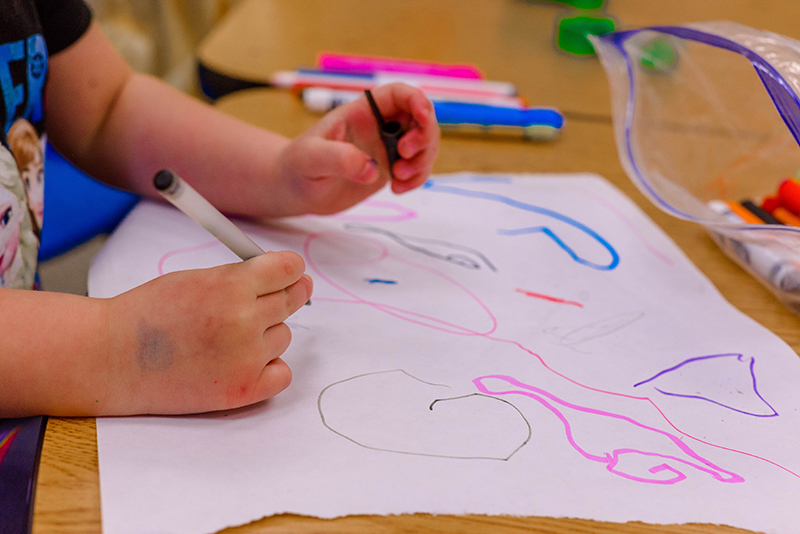June 18, 2021
Behavior in children with autism spectrum disorder challenged by COVID effects on family income, food insecurity
 A Purdue University study found that behavior in children with autism spectrum disorder were challenged by COVID effects on family income, food insecurity. (Photo by Erika Fletcher/Unsplash)
Download image
A Purdue University study found that behavior in children with autism spectrum disorder were challenged by COVID effects on family income, food insecurity. (Photo by Erika Fletcher/Unsplash)
Download image
Key research finding: Routine and structure are often essential in the lives of children with autism spectrum disorder (ASD), but during the early months of the COVID-19 pandemic, those key elements were upended in most parts of their lives. From schools moving to virtual classes to the temporary unavailability of favorite foods, many families experienced significant challenges. A study in the Purdue University College of Health and Human Sciences surveyed hundreds of families that have children with ASD across the U.S. to see how the pandemic affected behaviors at home. A majority of respondents reported a moderate-to-large impact on the child’s overall behavior (74%) during the pandemic. However, behaviors such as aggression and compulsiveness were more prevalent in households experiencing food insecurity, as defined by the United States Department of Agriculture as “a household-level economic and social condition of limited or uncertain access to adequate food.” More families with lower incomes before the pandemic were found to experience job loss or pay reduction, perpetuating existing disparities. Data from this study may be useful to tailor public health policy and interventions to mitigate the effects of the pandemic among vulnerable population subgroups within the autism community. Full story is available online.
 Anita Panjwani (Purdue University photo)
Anita Panjwani (Purdue University photo)
Download image
Anita Panjwani, postdoctoral research fellow in the Purdue Autism Research Lab and Department of Nutrition Science:
Panjwani uses her expertise in statistical analysis and human nutrition to bring unique viewpoints to Purdue’s autism and nutrition science research.
Bridgette Kelleher, associate professor of clinical psychology and neuroscience:
Kelleher’s research examines early behavioral and biological of risk and resilience in children with neurodevelopmental disorders.
Regan Bailey, professor of nutrition science and faculty associate in the Center for Aging and the Life Course
Bailey’s research focus is to improve the methods of measuring nutritional status to optimize health.
Research in Developmental Disabilities — Abstract is available online.
Funding — Discovery Park Big Idea Challenge Grant and the National Institute of Mental Health
Brief summary of methods: In May and June 2020, Panjwani recruited 200 parents or caretakers of children with ASD in 200 different households across the U.S. via social media. The children ranged from ages 2 to 17. The participants filled out Qualtrics surveys asking for demographic information and combined household income, which were divided into less than $50,000, $50,000 to $100,000 and greater than $100,000 groupings. Food insecurity was assessed using a short questionnaire validated against the USDA household food insecurity questionnaire. Questions focused on the impact on overall behavior of the child, as well as increasing, decreasing or steadiness of 15 behavioral traits commonly found in children with ASD — hyperactivity, tantrums and clinginess, for example. Additional questions on caregiver stress, eating habits and nutrition were asked for later publication.
Media contact: Abbey Nickel, nickela@purdue.edu
Source: Anita Panjwani, apanjwan@purdue.edu
Journalists visiting campus: Journalists should follow Protect Purdue protocols and the following guidelines:
- Campus is open, but the number of people in spaces may be limited. We will be as accommodating as possible, but you may be asked to step out or report from another location.
- To enable access, particularly to campus buildings, we recommend you contact the Purdue News Service media contact listed on the release to let them know the nature of the visit and where you will be visiting. A News Service representative can facilitate safe access and may escort you on campus.
- Correctly wear face masks inside any campus building, and correctly wear face masks outdoors when social distancing of at least six feet is not possible.
Note to journalists: Journalists visiting campus should follow visitor health guidelines.

